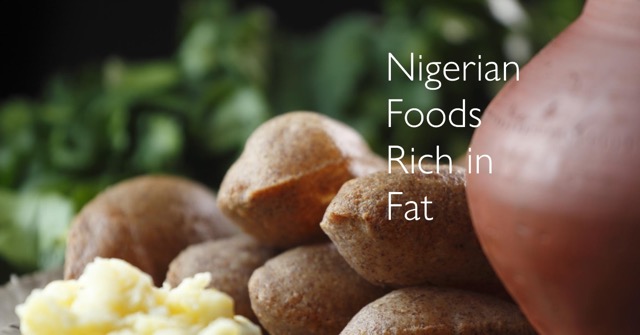Looking for Nigerian foods rich in fat?
Then you've landed on the right post
You see, many traditional Nigerian foods are high in fat.
But before we get to the list, I want to quickly point out that...
Dietary fat was once thought to be unhealthy, however, research studies [1, 2] now shows that some fats offer amazing health benefits.
Here are some high-fat Nigerian foods and their fat content:

Nigerian Fat-Rich Foods List
Here's the list and their fat count
1. Palm Oil
Palm oil is commonly used for cooking traditional Nigerian dishes and soups. It is very high in saturated fat (49.3g per 100g), but also provides beneficial antioxidants like carotenoids and vitamin E [3]. Enjoy palm oil in moderation.
2. Butter
Butter provides mostly saturated fat (51g per 100g), but also contains vitamins A, D, E and K2. Use sparingly as a spread or for cooking.
3. Avocado
Avocados are a creamy fruit high in heart-healthy monounsaturated fat (14.7g per 100g). They also provide fiber, folate and carotenoids like lutein and zeaxanthin. Enjoy avocado on sandwiches, in salads or guacamole.
4. mackerel
Mackerel is a fatty fish that’s full of anti-inflammatory omega-3 fatty acids (13.4g per 100g). It supports brain, heart and eye health. Grill, bake or pan cook them.
5. Palm Kernel Seeds
Palm kernel seeds are pressed to make palm kernel oil, highly saturated fat used for cooking in parts of Nigeria. The seeds can also be eaten on their own but are very high in saturated fat (49g per 100g).
6. Coconut Oil
Coconut oil is rich in lauric acid and provides quick energy, but is also exceptionally high in saturated fat (82.5g per 100g). Use sparingly for light cooking and frying due to its stability at high heat.
Checkout > how to make coconut oil at home
7. Coconut Meat
The white flesh inside a mature, fresh coconut can be eaten raw or used in cooking. It provides manganese, copper and selenium. But limit intake since it’s high in saturated fat (15g per 100g).
8. Roasted Groundnuts
Groundnuts (peanuts) are a popular boiled or roasted snack in Nigeria. They provide mostly monounsaturated and polyunsaturated fat, plus protein, B vitamins, vitamin E. Enjoy in moderation.
9. Tiger Nuts
Tiger nuts are small tubers with a sweet, nutty flavor. They can be eaten raw, roasted, baked or made into milk. Tiger nuts provide healthy unsaturated fats like oleic acid (18.4g per 100g).
10. Cashews
Cashews are kidney-shaped seeds high in unsaturated fats. Dry roasting brings out their flavor. They provide protein, iron, magnesium and antioxidants. Enjoy cashews in trail mixes or on their own.
11. Eggs
Eggs provide high-quality protein along with vitamins, minerals, and a mix of saturated, monounsaturated and polyunsaturated fats. Enjoy boiled, poached, scrambled or in dishes like omelets.
12. Full Fat Cheese
Cheese provides protein, calcium, vitamins A and B12, but can be high in saturated fat. Limit portions of cheese like cheddar (33g saturated fat per 100g). Try smaller amounts of strongly flavored cheeses.
13. Full Fat Yogurt
Full fat yogurt provides probiotics, calcium, B vitamins and a moderate amount of fat (4.8g per 100g), mostly saturated. Stick to unsweetened varieties and watch portions.
14. Pork
Fresh pork can be part of a balanced diet but contains more saturated fat than chicken or turkey (24.2g per 100g). Opt for lean cuts like tenderloin and eat pork in moderation.
15. Ogbono Seeds
Ogbono seeds are used to prepare a popular Nigerian stew. They thicken stews and provide nutrients like protein and calcium. But ogbono is very high in saturated fat (36.3g per 100g) so use sparingly.
By the way, here's a nice Ogbono soup recipe
16. Locust Beans
Locust beans are used as a food thickener and seasoning. They provide some protein, calcium and magnesium. Locust beans are a moderate source of both polyunsaturated (7.7g per 100g) and saturated fat (7.2g).
17. Fluted Pumpkin Seeds
Pumpkin seeds can be eaten roasted. They provide polyunsaturated fats, protein and nutrients that offer health benefits like lowering blood sugar. Enjoy pumpkin seeds in moderation as a snack or sprinkled on dishes.
18. African Pear/Ube
This pear-shaped fruit has a creamy pulp that’s high in calories from fat (18.4g per 100g). It also provides some vitamins, minerals and fiber. Enjoy African pear in moderation.
19. Fura Nono
Fura nono is a Nigerian millet porridge drink often mixed with milk and spices. The addition of milk provides protein, vitamins and minerals, along with some saturated fat (5.2g per 100g).
20. Beniseed
Beniseed are tiny black seeds used as a spice and to extract oil. Roasting brings out their nutty flavor. Beniseeds are high in antioxidants, phytosterols and both polyunsaturated (31.4g per 100g) and saturated fat (12.3g per 100g). Enjoy beniseeds in moderation as a seasoning.
21. Locust Bean
Locust beans are seeds used as a food thickener and seasoning. They provide some protein, calcium and magnesium. Locust beans are a moderate source of both polyunsaturated (7.7g per 100g) and saturated fat (7.2g).
22. Fried Akara (with Palm Oil)
Akara are bean balls that are usually fried in palm oil. This fried snack is rich in protein, vitamins and minerals from the beans but also high in saturated fat from frying in palm oil (13.5g per 100g). Enjoy akara in moderation as an occasional treat.
23. Other Nuts And Nut Butters
All other nuts and their butters are High in healthy fats and fiber. And they are good sources of protein and magnesium too.
Quick Summary Of Nigerian Foods High in Fat
| Food | Fat Content (per 100g) |
| Palm Oil | 99.45g |
| Coconut Oil | 99.06g |
| Butter | 99.06g |
| Ogbono (dehulled, raw) | 62.8g |
| Palm Kernel Seeds | 54.18g |
| Beniseed (whole, roasted) | 48g |
| Cashew Nuts (dry roasted) | 46.35g |
| Groundnuts (roasted) | 45.6g |
| Pork | 40.5g |
| Coconut (mature, fresh) | 36.45g |
| Tiger Nuts (raw) | 27.44g |
| Locust Bean | 18.7g |
| Fluted Pumpkin Seeds (raw) | 18.43g |
| African Pear/Ube | 18.375g |
| Cheese | 17.2g |
| Full-Fat Yogurt | 17.2g |
| Eggs (Fried) | 15g |
| Avocado | 14.66g |
| Fried Akara (with palm oil) | 13.46g |
| Eggs (Boiled) | 11g |
| Fura Nono | 5.17g |
Not All Fats Are Created Equal
There are several main types of dietary fats:
Saturated Fats
- Found mainly in animal products like meat, eggs, dairy
- Also in coconut oil, palm oil, and palm kernel oil
Unsaturated Fats
- Found in plant sources like nuts, seeds, avocados, olives, vegetable oils
- Divided into monounsaturated (MUFA) and polyunsaturated (PUFA) fats
- Provides health benefits and helps lower LDL "bad" cholesterol
Trans Fats
- Unhealthy fats formed through hydrogenation in processed foods
- Found in biscuits, frozen pizza, microwave popcorn, fast food
- Increases inflammation and raises LDL cholesterol
- Avoid completely
Omega-3 Fatty Acids
- Type of polyunsaturated fat with exceptional health benefits
- Found in fatty fish, flaxseeds, walnuts, canola oil
- Anti-inflammatory and supports brain, heart, eye health
Cholesterol
- Special type of fat only found in animal foods
- High cholesterol levels in blood increase heart disease risk
- Dietary cholesterol less significant than saturated and trans fats
The skinniest summary: Focus on getting more of the unsaturated and saturated fats from whole food sources like fish, nuts, seeds, avocados, palm oil and coconut oils. Avoid trans fats, and keep dietary cholesterol in moderation.
Conclusion on Nigerian foods rich in fat
As seen above, many traditional foods in Nigerian cuisine are high in fat, especially saturated fat. Palm oil, coconut products, animal foods like eggs and pork, and nuts and seeds lead the list. However, dietary recommendations on fats have evolved over time.
While fat was once demonized as a cause of obesity and heart disease, research now shows that the relationship is more complex. The specific types of fats matter more than total fat intake. Some fats even provide health benefits. The key is choosing the right kinds of fats from whole food sources.
The American Heart Association recommends limiting saturated fats to no more than 10% of total daily calorie intake. Foods high in saturated fat like palm oil, coconut oil, pork, and cheese should be eaten in moderation. However, emerging evidence suggests that saturated fats from dairy sources may not negatively impact blood cholesterol levels in the same way as red meat.
Replacing some saturated fats with unsaturated fats can help maintain normal cholesterol levels. Many traditional Nigerian foods provide healthy unsaturated fats—cashews, groundnuts, avocados, fish, beniseeds, pumpkin seeds, tiger nuts, and more. These foods can be enjoyed as part of a balanced diet.
The worst fats come from processed and fried foods. Heavily processed vegetable oils and trans fats found in biscuits, frozen foods, chips and crisps contribute to inflammation and heart disease. Palm oil is often used for deep frying traditional snacks like chin-chin and puff-puff at high heats which can damage the quality of the oil.
Beyond fats, it’s important to evaluate a food’s overall nutritional value. For example, eggs provide a range of beneficial vitamins, minerals, antioxidants and protein despite being high in cholesterol. Similarly, full-fat dairy products contain protein, calcium, vitamins and probiotics. The key is moderation of total fat intake while still getting valuable nutrients.
A truly healthy diet focuses on whole, minimally processed foods. Natural foods like nuts, seeds, avocados, olives, fish, eggs, yogurt, cheese, and even fresh meats have a place in a well-rounded way of eating. Enjoy these high-fat Nigerian foods while also emphasizing fruits, vegetables, legumes, whole grains and fiber at meals and snacks.
Additionally, the way foods are prepared impacts their nutrition. Roasting, baking and light sautéing are healthier cooking methods compared to deep frying. Try cooking with oils high in monounsaturated and polyunsaturated fats like olive oil and groundnut oil instead of palm oil. Avoid overcooking eggs and vegetables to preserve nutrients.
Remember that each meal and snack is an opportunity to provide your body with a diversity of nutrients it needs to function optimally. Pay attention to serving sizes of high-fat foods and create an eating pattern that focuses on whole, minimally processed options.
By thoughtfully incorporating high-fat Nigerian foods as part of an overall balanced eating plan, you can simultaneously enjoy cultural cuisine and promote good health. Consider all aspects of your diet and lifestyle for a well-rounded approach to nutrition and wellbeing.

I like your page and I learnt a lot on how you really broke down and distinguished the different types of fat and their examples.
I would like to ask a question?
1. Is it okay to eat fried egg or boiled egg if one is hypertensive?
2. Is Garri drinking with cashew nut or groundnut okay to have without unhealthy complications?
3. Can a hypertensive person also take milk as an option for protein?